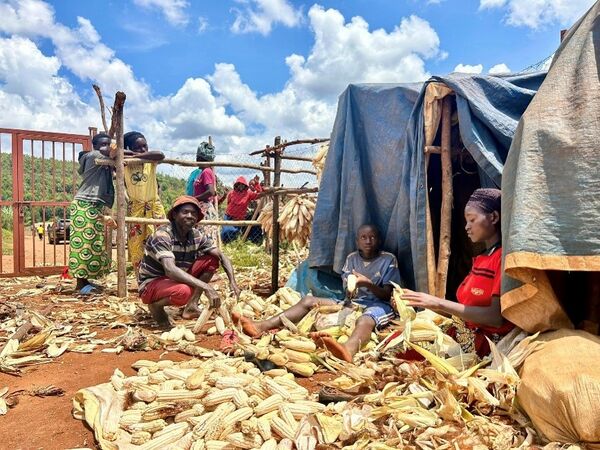In March, I visited our work in Rwanda with Programme Manager, Rachel English. This was my first time in Rwanda (indeed my first visit to sub-Saharan Africa), and I quickly came to know it as a truly beautiful country with amazing landscapes, a rich culture and incredibly warm people. I visited for a week of meetings and field visits, keen to see for myself how our agricultural finance programme is transforming the lives of farming families in rural communities.
We kicked things off with a visit to Equity Bank’s headquarters and Urwego Finance. It was energising to hear that, through our partnership, more than 11,000 farmers have already received training in group dynamics and financial literacy. The bank branch in Huye was buzzing with activity – Equity’s goal of growing its agricultural portfolio from 12% to 30% by 2030 suddenly felt very tangible. These were not just targets on a spreadsheet, but real people and real livelihoods.

These are the maize farmers I met in the hills of Huye. Here, they are preparing the maize for drying.
One of the most humbling moments came when we met with 371 cooperative members – farmers growing maize and rice in the rolling green hills of Huye. Around 90% of those we support here are members of cooperatives, who are using group savings mechanisms to build their financial knowledge. One farmer stood up and said, “You are teaching us how to fish instead of giving us a fish.” His words so wonderfully captured what we’re trying to do.
We also visited a Village Savings and Loan Association (VSLA) that has grown from saving just 100 RWF (£0.52) to 10,000 RWF (£5.21) a week. These modest but consistent savings are changing lives – covering school fees, paying for health insurance, and building creditworthiness. These aren’t just financial tools – they are keys to dignity and self-reliance.

Here, Rachel and I took a photo with one of the farming cooperatives we spoke to in Karongi.
Midweek took us to Karongi, in Rwanda’s stunning Western Province, where the mountains meet the shores of Lake Kivu. Here we met staff at Inkunga, one of our financial institution partners, and talked through everything from finance to green agriculture. Our work together has helped train and organise groups who previously lacked structure or leadership. Now, 894 groups strong, these communities are rewriting their futures.
In Karongi, one group of farmers showed us their regenerative agriculture plot. Their latest harvest had tripled in yield compared to the year before. They explained how planting in lines had reduced their seed usage and labour costs. Their crops looked healthier, and their optimism was contagious. It was the first time they’d had a surplus to sell. With savings through Inkunga, they now hope to buy a motor pump to irrigate more land. It was a powerful example of how training and access to finance can unlock potential.
We also met a group using DreamSave, a mobile app that helps digitise their savings. Watching them navigate the technology with ease was a reminder of how innovation, paired with trust and training, can amplify impact.

In Muhanga, we met with this farming cooperative, who we took a photo with and they glady obliged.
On Thursday, we travelled to Muhanga to meet Clecam EjoHeza Bank’s CEO, Merchias. His commitment to financial inclusion was clear – not only in words but in action, like reducing interest rates for farmers from 24% to 18%. In Clecam, the farmers are shareholders, with a real stake in the institution’s success. After the meeting, I was delighted to have the opportunity to meet our client, Felicia, whose story was behind the 2024 Christmas Appeal. Over lunch, I heard more about her successes as president of her savings group and shared the appeal leaflet with her – she was very excited to see herself in print.

Felicia proudly holds the leaflet telling her story for our 2024 Christmas Appeal.
What made a lasting impression was hearing from the clients themselves. Betty shared how she used her loan to buy pigs and install running water at home. Jean spoke of learning to manage household expenses and pay school fees through her farming. Her next dream is to own her own house. These women are not just clients – they are changemakers, lifting their families and communities alongside them.
As I boarded the plane home, I felt immense gratitude for the hospitality we received, for the dedication of our partners, and most of all, for the incredible resilience of the clients we serve. My time in Rwanda reminded me that change is not always loud or fast, but when it’s rooted in community, supported by partnership, and driven by dignity, it is transformative.
Our project in Rwanda aims to uplift 24,000 farmers and rural entrepreneurs through access to finance and training. We're giving them the tools they need to lift themselves out of poverty and build a secure livelihood.